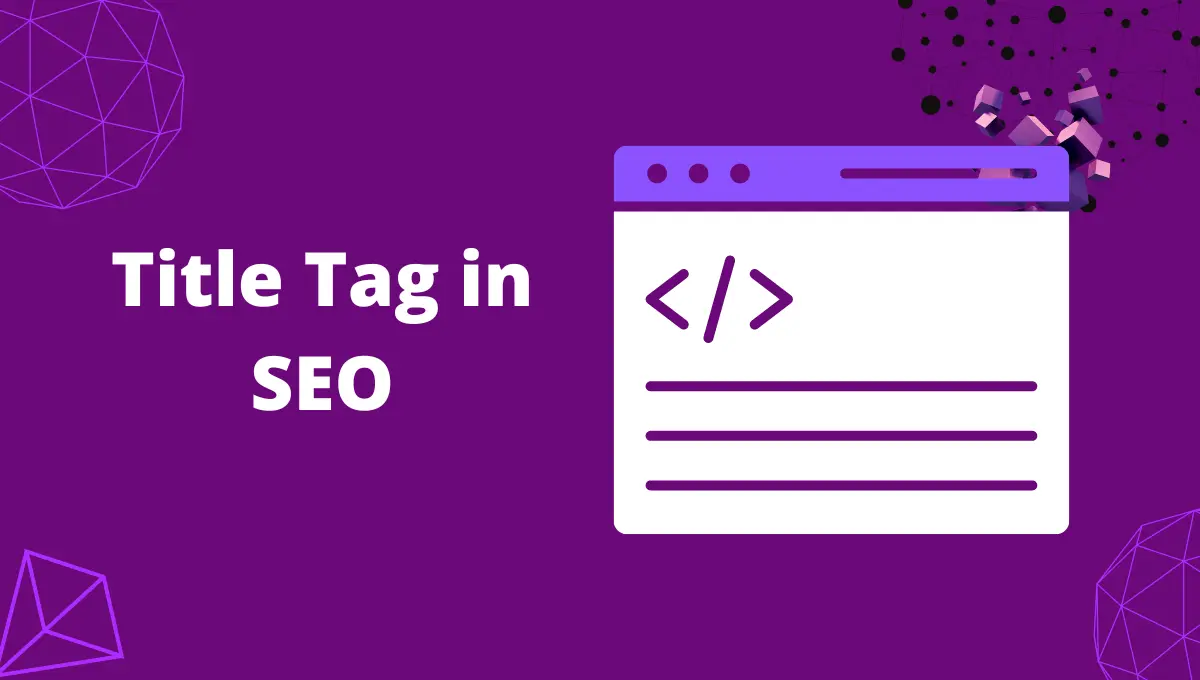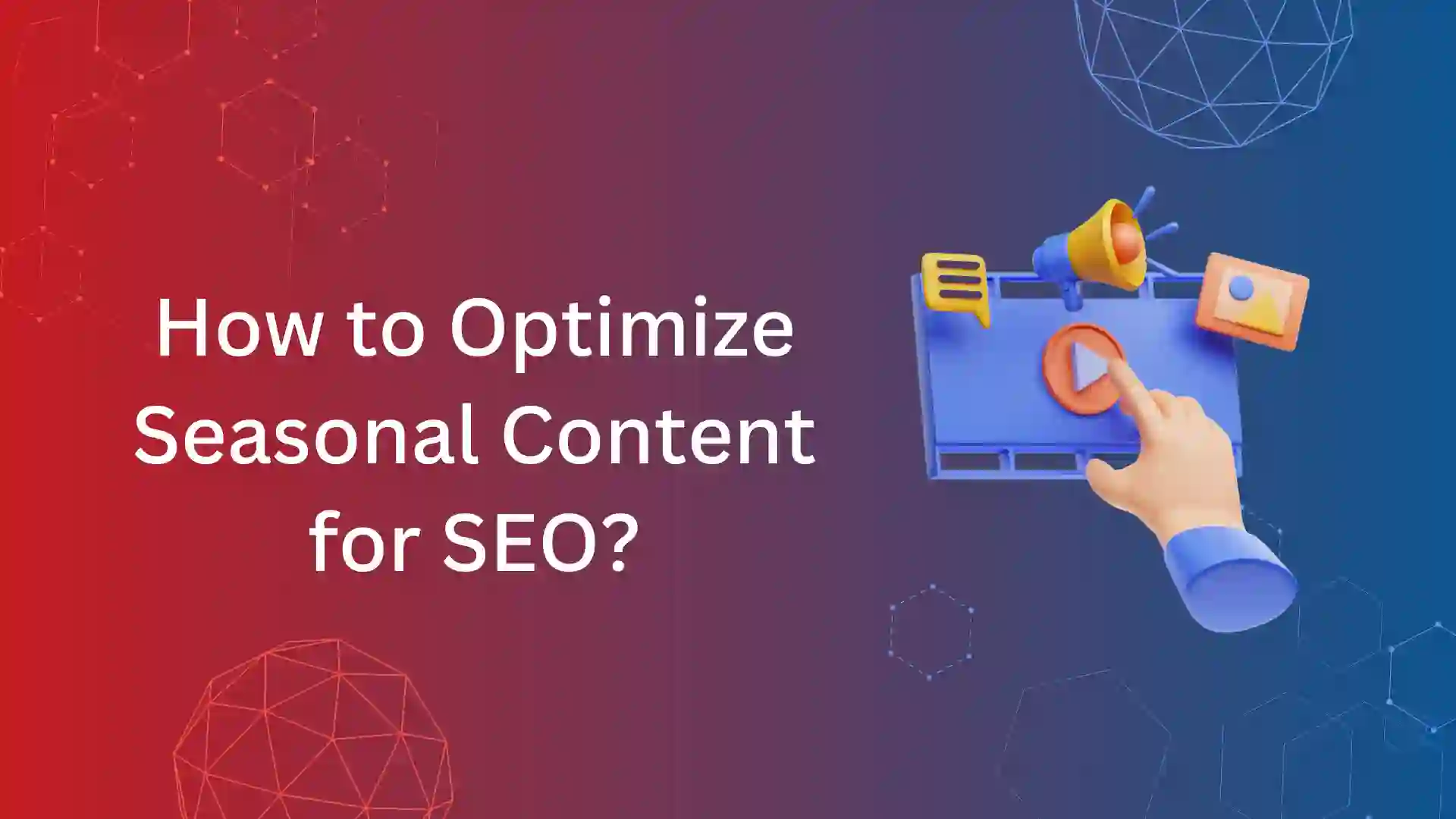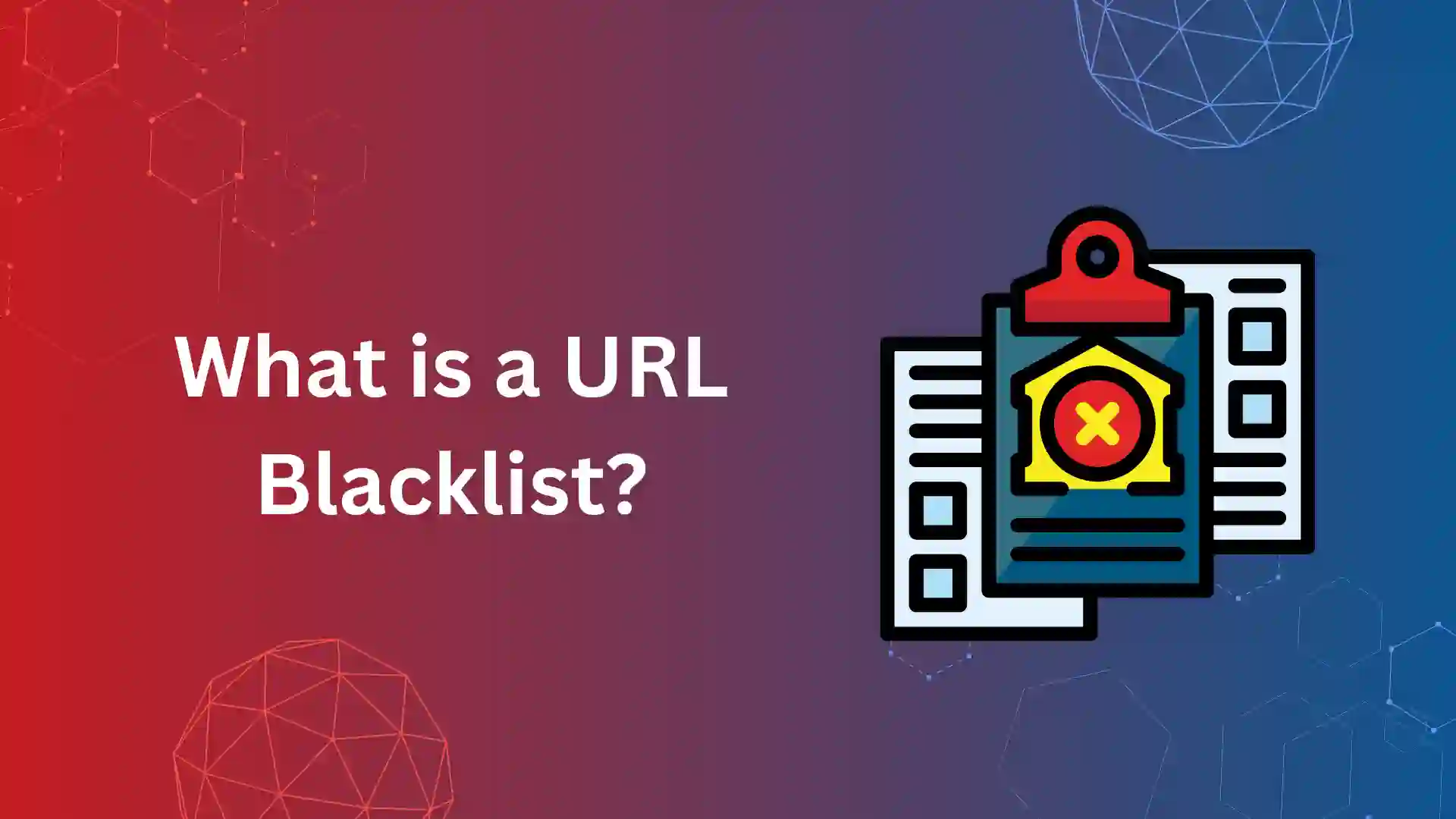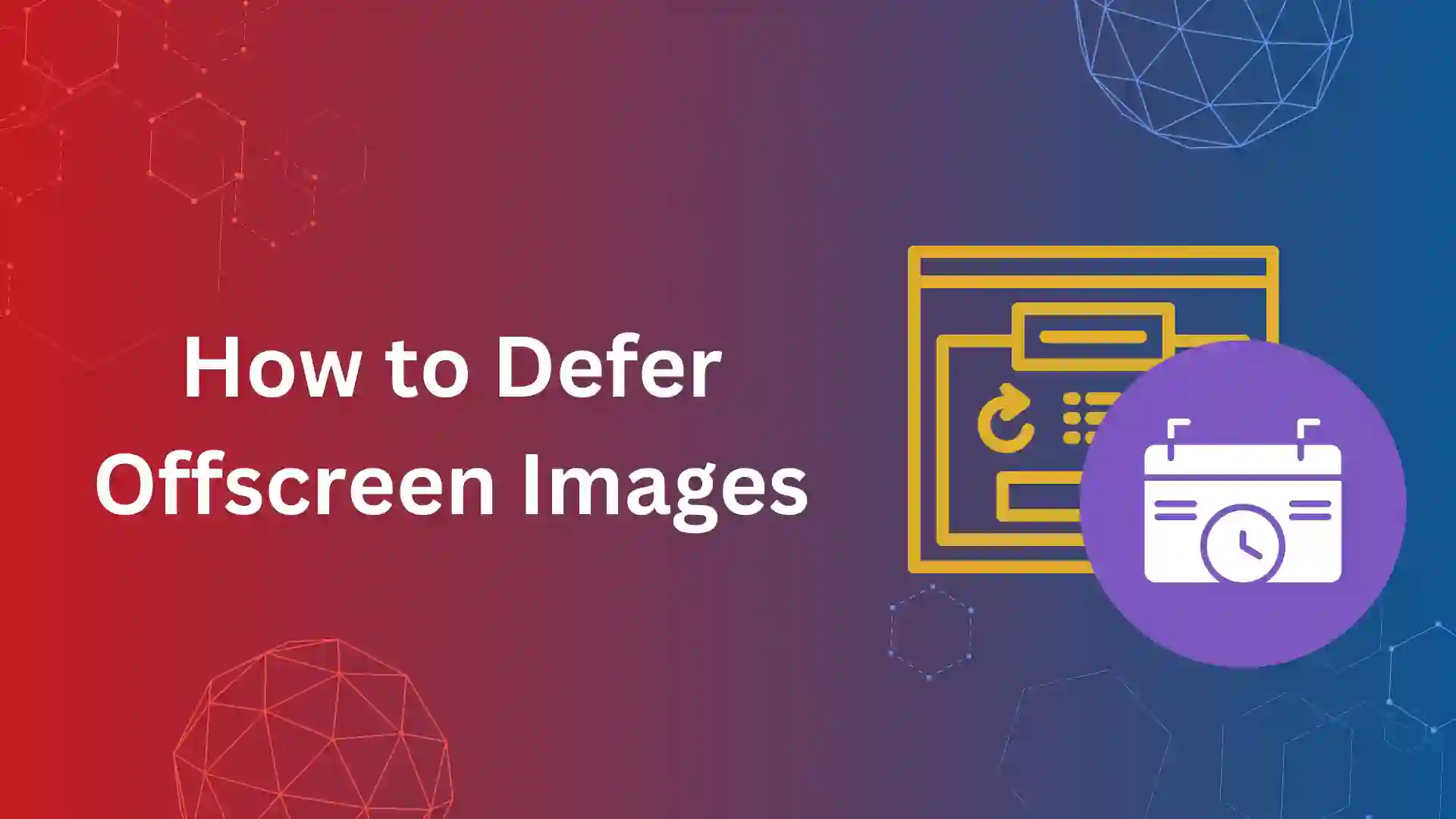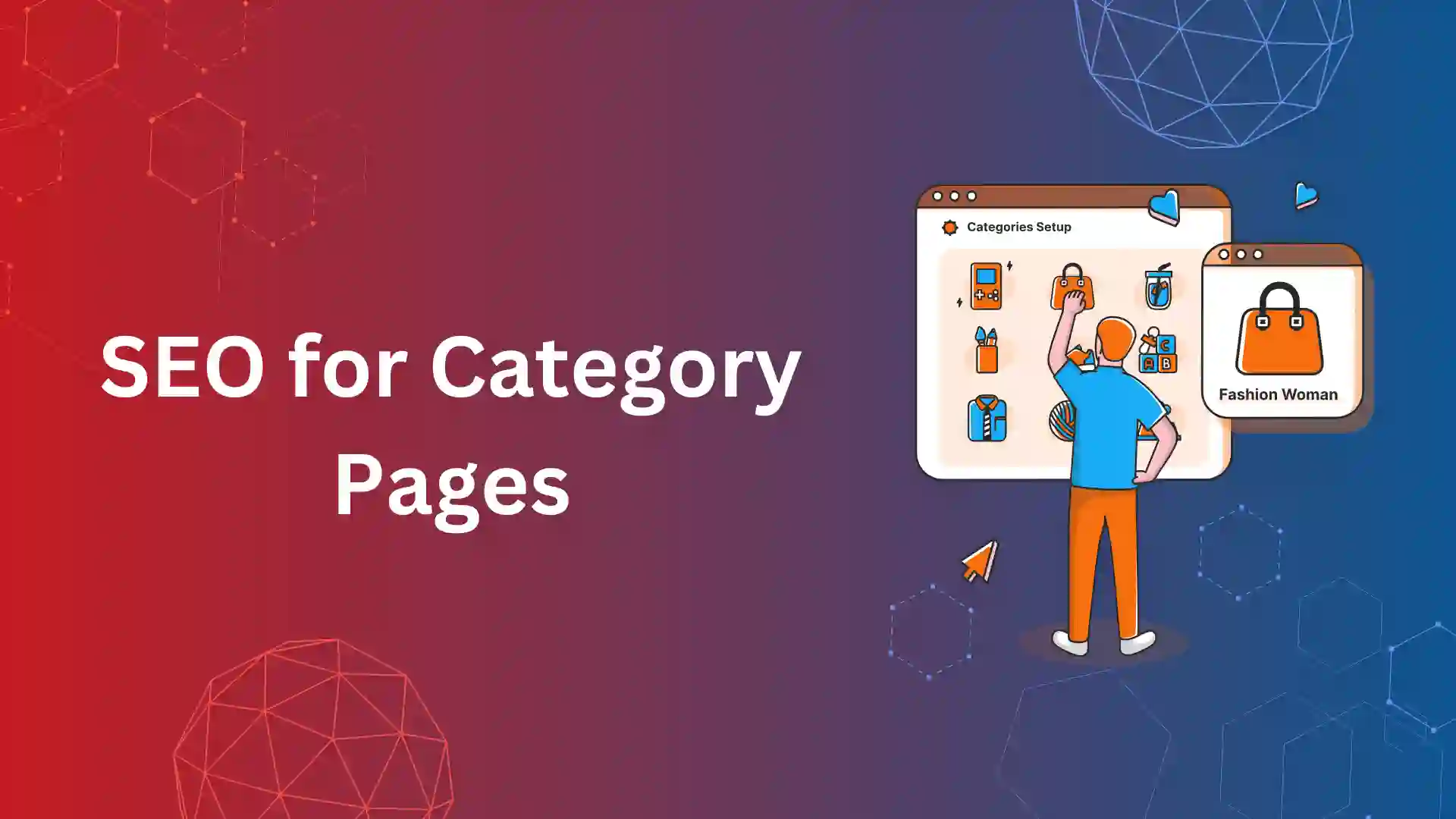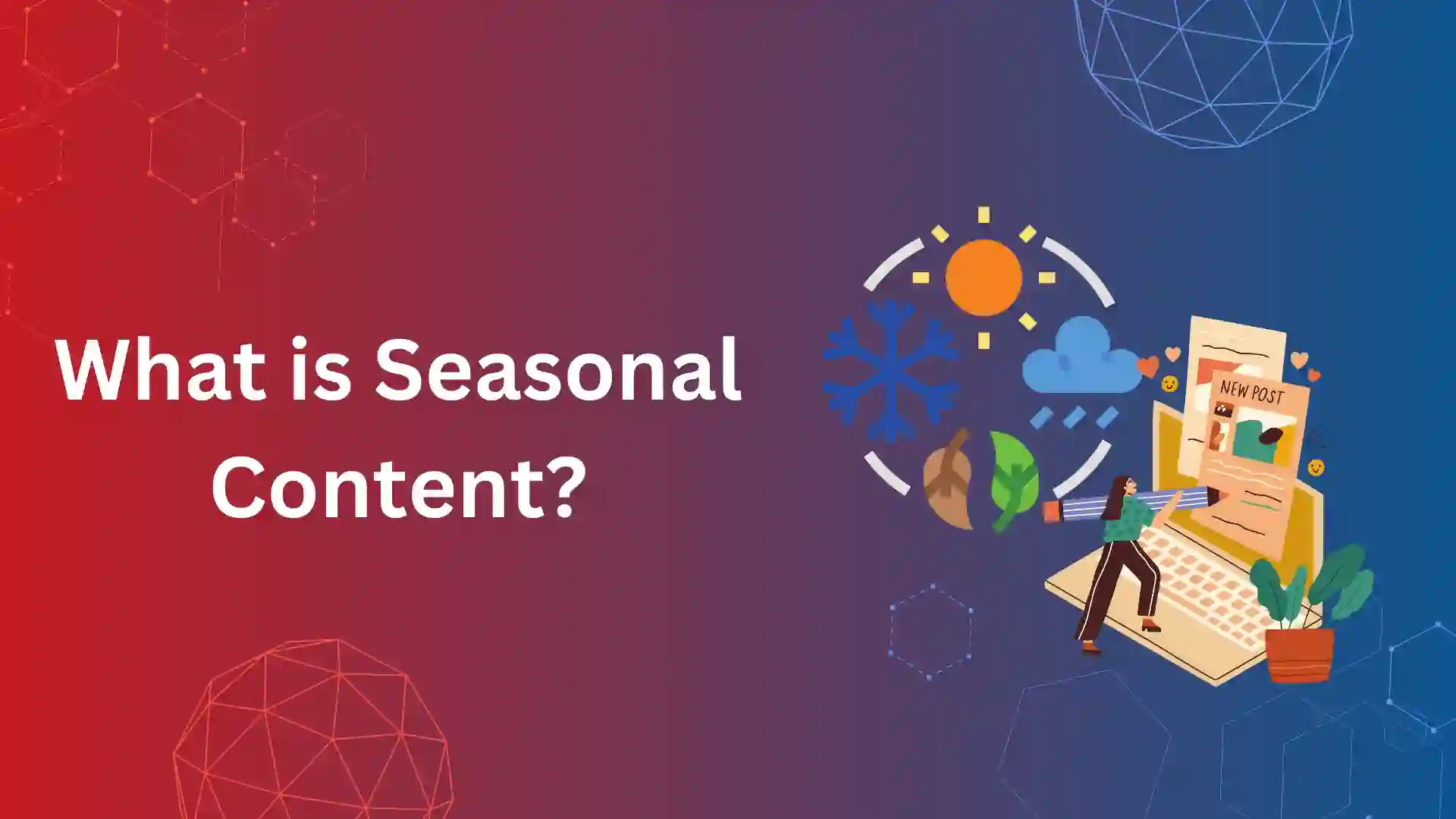The title tag in SEO is similar to the title of any book and is still a ranking factor. The crawlers understand the context of any web page and its relevancy by reading the HTML title tag.
This HTML tag gets featured in SERP (search engine results page), seems to be highlighted, and the responsible user clicks them.
In recent Google core updates, the importance of the title tag as a ranking factor has fallen. Google tries to replace this HTML tag with a Header tag.
The reason behind this is irrelevancy, over-optimization, and long and duplicate title tags.
So, it is important to know to optimize adhering to webmaster guidelines. This article will add more value to how to write a title for a page that improves the click-through rate (CTR).
What Is Title Tag in SEO with an Example?
A title tag is an HTML element used to indicate a webpage’s title; it is not confused with header tags. It is also known as a meta title.
There are many title tags, including short, long, branded, non-branded, descriptive, persuasive, and both.
The title tag appears as follows and is found in the head section of a page:
<html>
<head>
<title>Best SEO Services Company for 10x Returns - 7 Eagles</title>
</head>
</html>
Why Is SEO Title Tag Important for Search Engines?
The title tag is one of the important components of On-Page SEO and has been a ranking factor for years.
Search engines like Google and Bing can’t read the complete content like humans to understand the web page’s relevancy.
So, the first signal that search engine gets the relevance of a web page is by crawling and rendering the HTML title tag.
This is crucial for both users and search engines, as both can read; search engines read via HTML code and users read via SERP.
Here are a few importance of title tags in SEO.
1. Title tag with keyword is a ranking factor:
Since the 1990s, search engines have advanced significantly. But among their variable ranking factors, Google recognize keyword in title tag from ancient time.
Google webmaster guideline on page title clarifies that a page title should have a descriptive, unique, and accurate with the focus keyword.
John Mueller, Google search advocate has once mentioned, keyword with HTML title tag is a ranking factor. Keyword at the beginning of the page title motivates to check the result page.
2. Title tag is responsible for high CTR:
Over the years, numerous SEO professionals and search marketing agencies have spoken extensively about CTR (Click-Through Rate).
The percentage of total searches that leads to clicks on a particular search result is known as the “click-through rate.” It matters for a few reasons:
- It aids you in assessing the performance of your title tag.
- It affects how results display in search engines.
- There is an impact on your website traffic.
Title tags that are more appealing among the visible snippet in SERP can drive high CTRs, which increase website traffic.
Another ranking factor that has not been written is CTR. Google always strives to promote what users like; CTR is among them; it signals search engines how users behave to our SERP posts.
This eventually increases your organic position on the 1st page of SERP.
3. Title tag is visible in SERP:
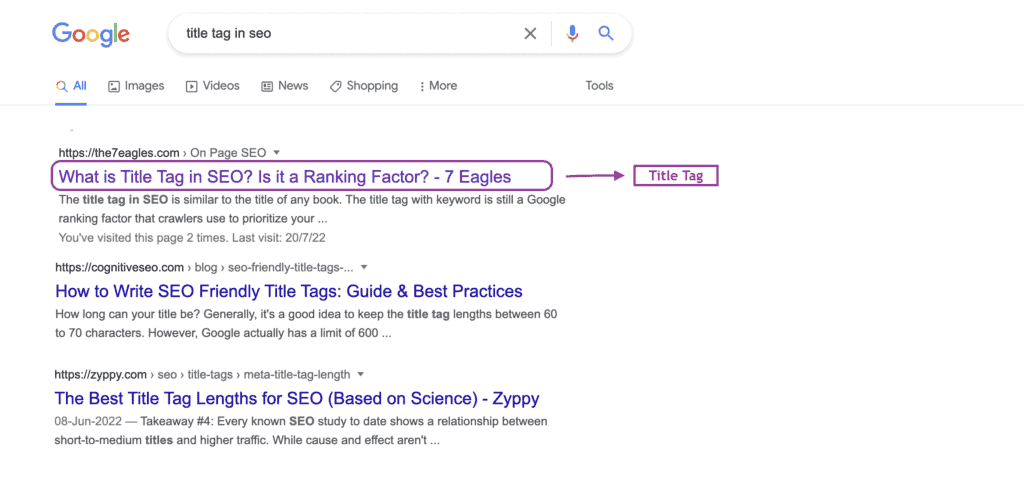
In SERP, the title tag of a web page is highlighted compared to the URL or Meta description in the search snippet (SERP). You can see the above image for reference.
This gets the first impression in the eyes of the user with the same intent. So, when the title tag resonates with their purpose, added with emotional or powerful words make them check the post.
This is why you should have an optimized HTML title tag. We advise starting the page title with a focus keyword, which drives high CTR.
4. Title tag is visible in the web browser:
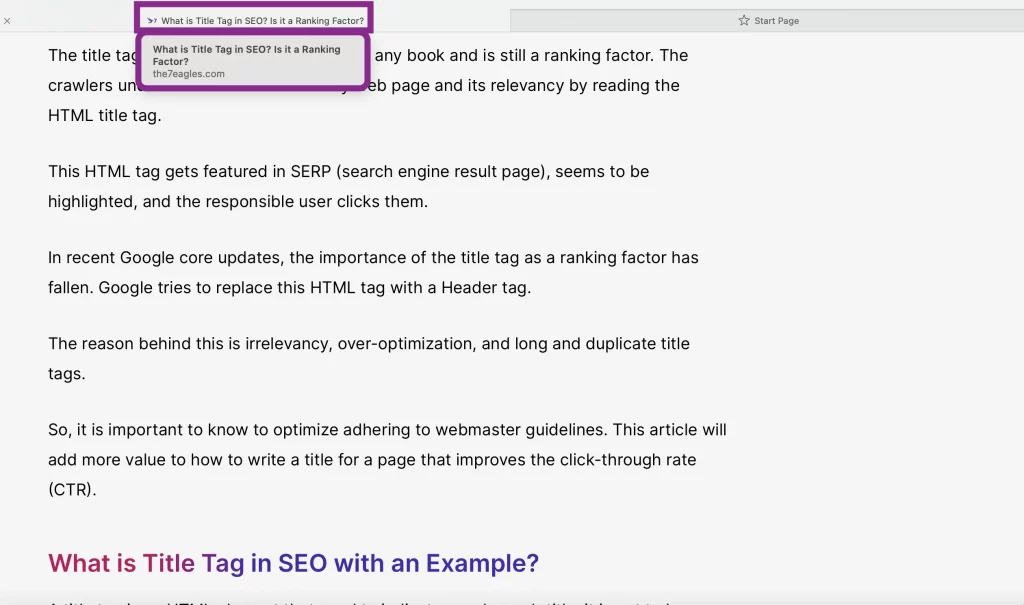
Your title tag will show up in the browser tab in addition to the SERPs. When visitors need to revisit that page, it will be simple for them to recall if it is well-crafted.
- It displays at the top of the browser window or is used as the Bookmark name when adding a web page to your Favorites.
- This tag is also commonly referred to as the element.
- HTML document title is visible in the browser’s title bar.
5. Title tag is visible in social media posts:
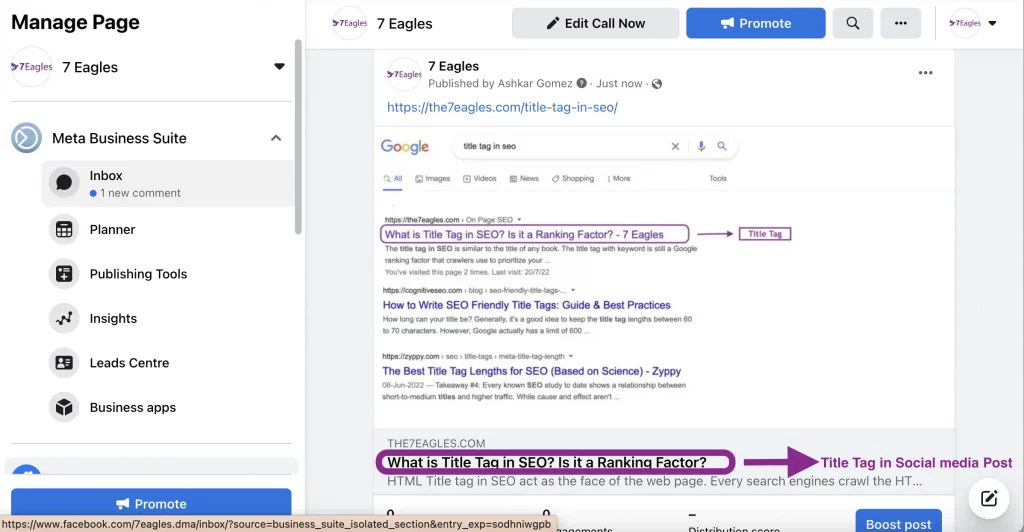
The title tag is typically used as the anchor text for links to a page on other websites and social media platforms.
- Now every website allows user to share their pages on social media. We have seen Facebook, Twitter, and Instagram icons on the website that begging to be clicked.
- It is the most effective way for businesses, small vendors, and individuals to gain awareness.
- Web developers make sure that appropriate web pages are properly prepared. Get yours correctly for this additional purpose.
How Long Should Your Title Tag be?
A page title tag should be less than 60 characters for desktop view. The number of characters includes all the spaces and special characters. Regarding pixels, the HTML title tag should be less than 580 px.
For mobile view, a page title tag should be less than or equal to 40 characters.
In SERP, the length of the title tag appears under the recommended character. Any page with more than the recommended count will appear incomplete, or Google might replace the title tag with a header or sub-headers.
How to Optimize the Title Tag for Better Ranking?
You need a compelling headline to hold the audience’s attention before they read the content.
However, your title tag has the most influence on the snippet of the search engine results page.
As a result, if you want to get someone to visit your website successfully, you must improve the page title.
These eight key factors should consider while optimizing your title tag in SEO.
- The context of the page inside the site
- User-Intent keywords
- The topical relevance of the page
- Uniqueness
- The use of dynamic options
- CTA (Call to Action) in SERP
- The need for restraint
- The relative importance of the title tag
1. Unique Title Tag for Every Web Page:
Google never promotes any web page with duplicate title tag. This makes search engines to confuse on understanding the relevancy of web pages.
So, you should be clear using unique title for every pages of the website. This duplicate tag issue is reported in Google search console and Bing Webmaster tool.
Search engines either ignore the web page from ranking or replace title tag with other tags like header or sub-header.
If you don’t get notification through Google Search Console or Bing webmaster tool, use Screaming frog to crawl all the web pages.
So, always try to use unique and descriptive page title using a custom format.
2. Keywords at the beginning of the title tag:
As per an experiment by Moz, keywords at the beginning of the title tag have great ranking factors.
Furthermore, user experience research team nngroups demonstrates that individuals might only read the first two words of a headline.
For this reason, we advise to use page titles with the focus keyword.
Titles that front-load repetitious material do not initially appear to have much unique value.
Additionally, the most distinctive part of a title like this is most likely to vanish if search engines shave it off.
These titles might also seem keyword-heavy and are most likely to have had Google rewrite them.
3. Title relevancy to page content
If a title does not accurately reflect the content of the page, search engines will quickly detect this and will not rank the page well for those terms. Additionally, it is more probable that a visitor may click the back button and abandon the website while reading it.
For example,
If you are searching for secondhand furniture and if it shows new furniture, then the user will be disappointed.
You notice a difference as soon as you land on the website. Due to the fact that the first word preowned does not appear until halfway down, there is a chance that users will click the back button before learning the important information. According to the majority of experts, a page’s position and relevancy should be carefully evaluated.
4. Use numbers and dates in the title tag:
- A study found that using numbers and dates had a 20% higher CTR.
- These titles are thought to feel less robotic and packaged.
- If numbers and dates are at beginning of the title it would attract the user’s attention.
- Numbers and dates usually replicate the actual fact so the user will attain attraction.
Example :
- 10 unique tips to clean your house
- 2020 throwback sports events
5. Use powerful for getting high CTR:
The more emotional title tag leads to an increase in CTR.
The powerful words are more powerful they will lead searchers and will make your headline.
Power words include:
- Best
- Proven
- Fast
- Scientifically proven
Example:
Scientifically proven methods for diet
Best YouTube marketing strategies
6. Never over-optimize title tag with keywords:
Google may occasionally display a title that differs from the one you’ve marked up in your HTML.
It can be annoying, but there isn’t a simple solution to make the search engine utilize the title you’ve specified.
As mentioned above, Google may decide to rewrite your title if you attempt to fill it with keywords (a practice known as “over-optimization”).
Google also appears to be attentive to words that have been joined together using delimiters like pipes.
Consider improving your title to make it more beneficial to search users for this and numerous other reasons.
7. The title tag should be under 60 characters:
- It’s common knowledge that Google’s search engine results pages typically display between 60 and 65 characters (letters, spaces, and integers) for each search query (SERPs).
- If a title is longer than that, Google may shorten it or completely rewrite it.
- To optimize clicks and traffic to the website, it’s critical to get the title tag right because it appears prominently in the SERPs.
- There is also the possibility that title tags, which make up a small portion of ranking factors, could affect search results.
8. Usage of brand name:
- Often advise adding your company name to the end of the title tag across the entire website (especially if the brand name is short, catchy, and unique).
- The fundamental justification for this is that it promotes branding (people consistently see the name pop up in SERPs).
- If a keyword appears in the brand name, the strategy also produces some unanticipated long tail.
- Really, I didn’t see any drawbacks: in the worst situation, the name is simply removed from SERPs (if the title turns out to be too long).
- All title tags were guaranteed to be original by keeping the name closer to the finish.
Why Isn't Google Using My Title Tags?
Page titles significantly affect click-through rates because they provide search engines with essential context. But according to a recent study, Google rewrites page names by more than 60%.
The various factors are the following:
Too long or too short: title length must be between 50-60 characters if the length is too long it brings a negative user experience, if too short that won’t give needed information to the brackets.
Bracket and parenthesis: many websites emphasize page titles with parenthesis and brackets, but if you do, Google is significantly more likely to change your title.
Title separators: colons, pipes, and dashes are common ways to break title up, pipes are mostly replaced with dashes
Over Optimization: using keywords multiple times in title tag are another reason of Google replacing them. Perhaps, this is an act of keyword stuffing.
Title Tag Irrelevant to Context of Web Page: always try to keep the page title in relevant to the content of the web page. Google might replace with other HTML tags, if you the title is relevant to the web page.
Other factors: many keywords, the same title for multiple pages, and unwanted usage of brand names
Conclusion:
Titles matter a lot! They are unquestionably taken into account when determining rankings.
Try to accurately and succinctly describe your material in the title. Include your keywords that have a lot of search volume and, most essential, are relevant to your content while doing this.
Give us more information about your project, and we’ll look into how we might help you get the outcomes you’ve always desired.
If you look for a Title tag that is optimized to get high CTR, kindly hire us for On-Page SEO Services.

